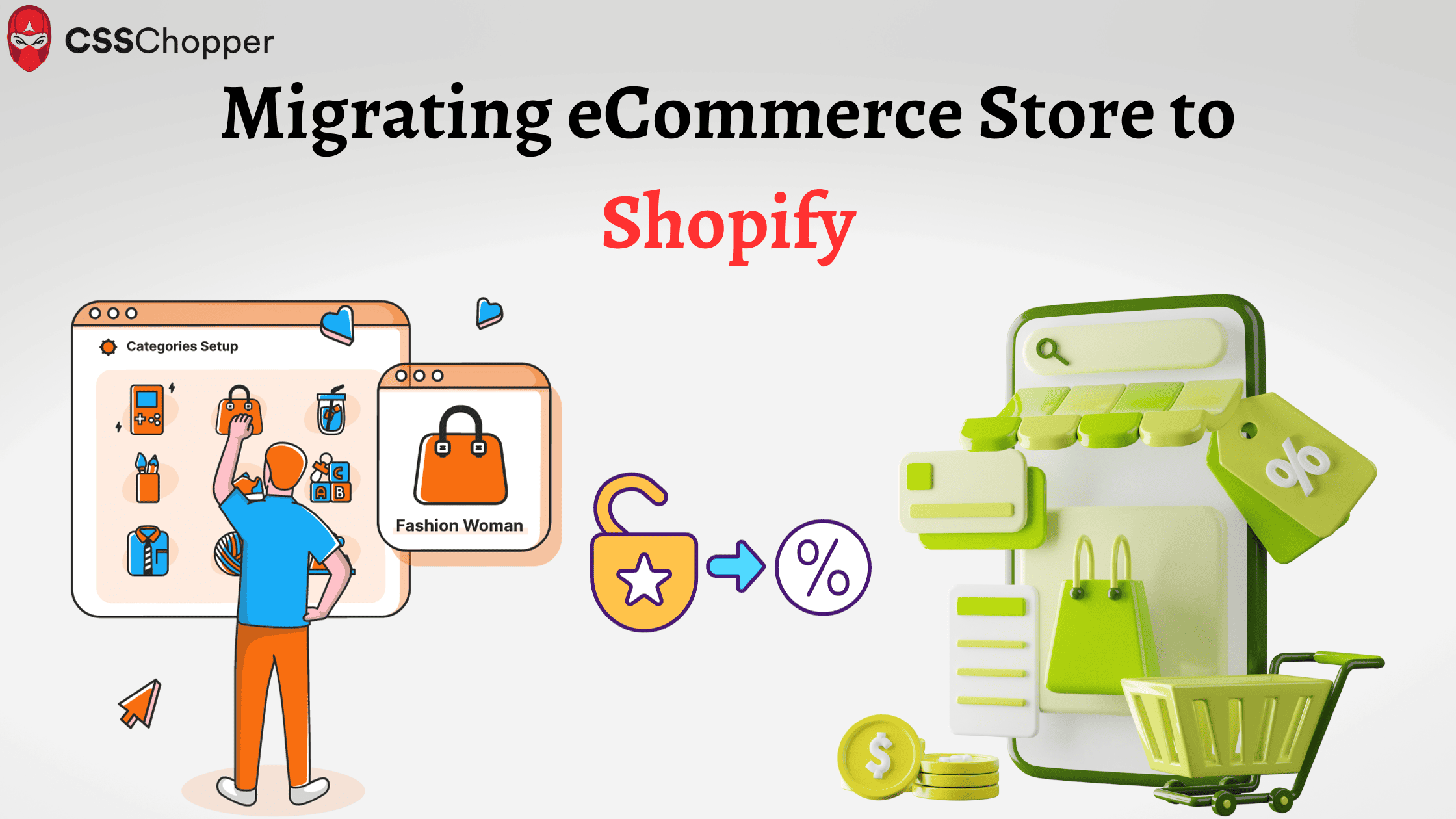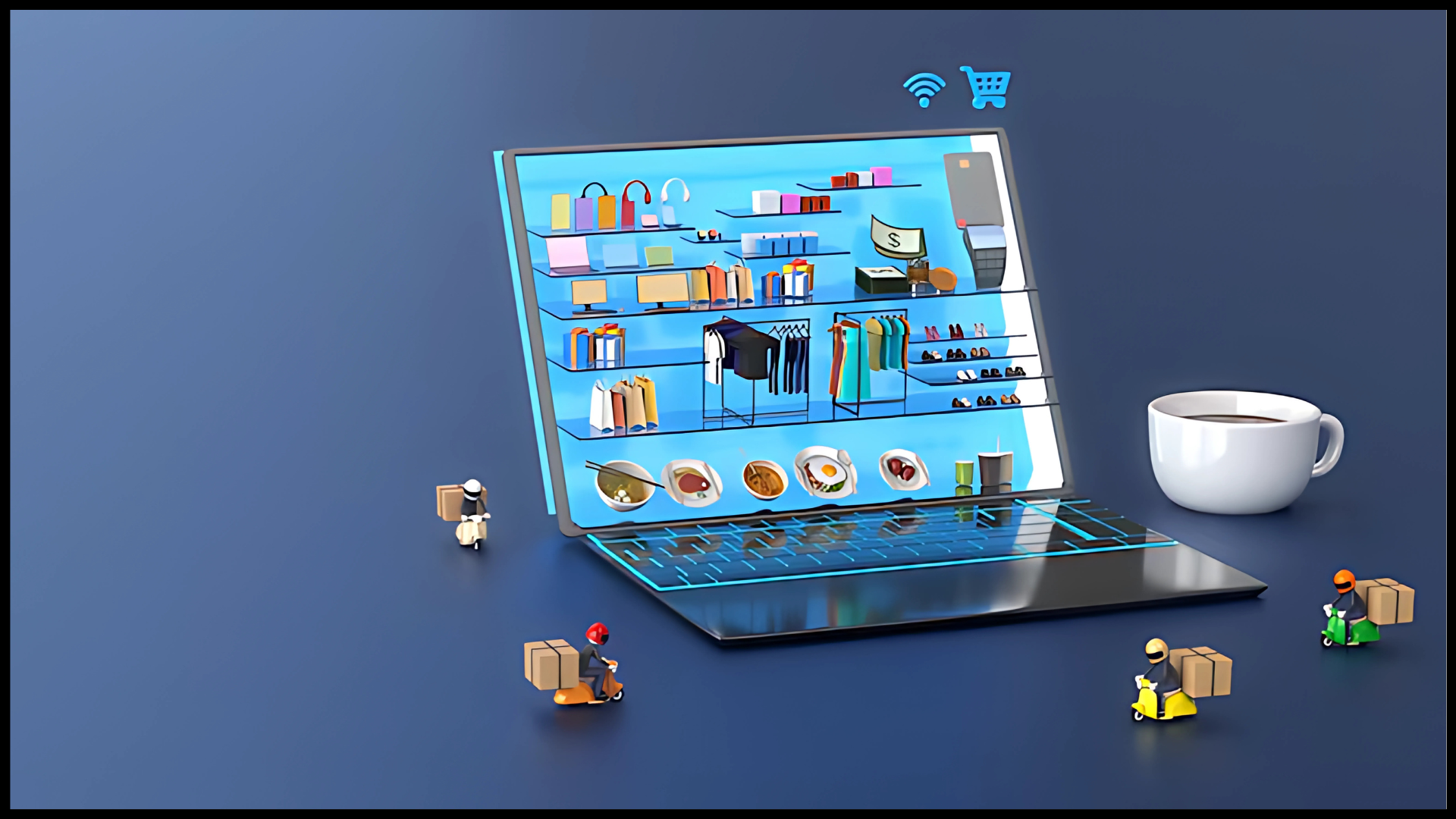Staying ahead in today’s fast-paced eCommerce world is not just an option. It’s a necessity. This industry has become an integral part of modern-day business, and it is evident with the growing number of sales. By the year 2024, it is expected that over 21% of retail sales will happen. As businesses evolve, so do their online platforms to reach new customers with an improved online presence. This brings us to the pivotal decision of migrating your eCommerce store. But this can’t be done without the selection of a CMS that fits your business needs. Shopify, among various platforms, is one of the most preferred eCommerce platforms.
Now, you must be wondering questions like: How can the migration process take place? Can it be done manually, or require assistance? All these questions are worth considering while opting for eCommerce migration. Shopify development allows a business to create a user-friendly eCommerce store. With its robust features, user-friendly interface, and scalable architecture, Shopify offers a comprehensive solution to elevate your online business to new heights.
Why Should a Business Consider eCommerce Migration?
Outdated features or plugins on your previous platform can affect the overall performance of a website. This can slow down the loading time, making navigation difficult for users. Whether it is the need for scalability, advanced features, or a more user-friendly interface, migration of a website becomes imperative.
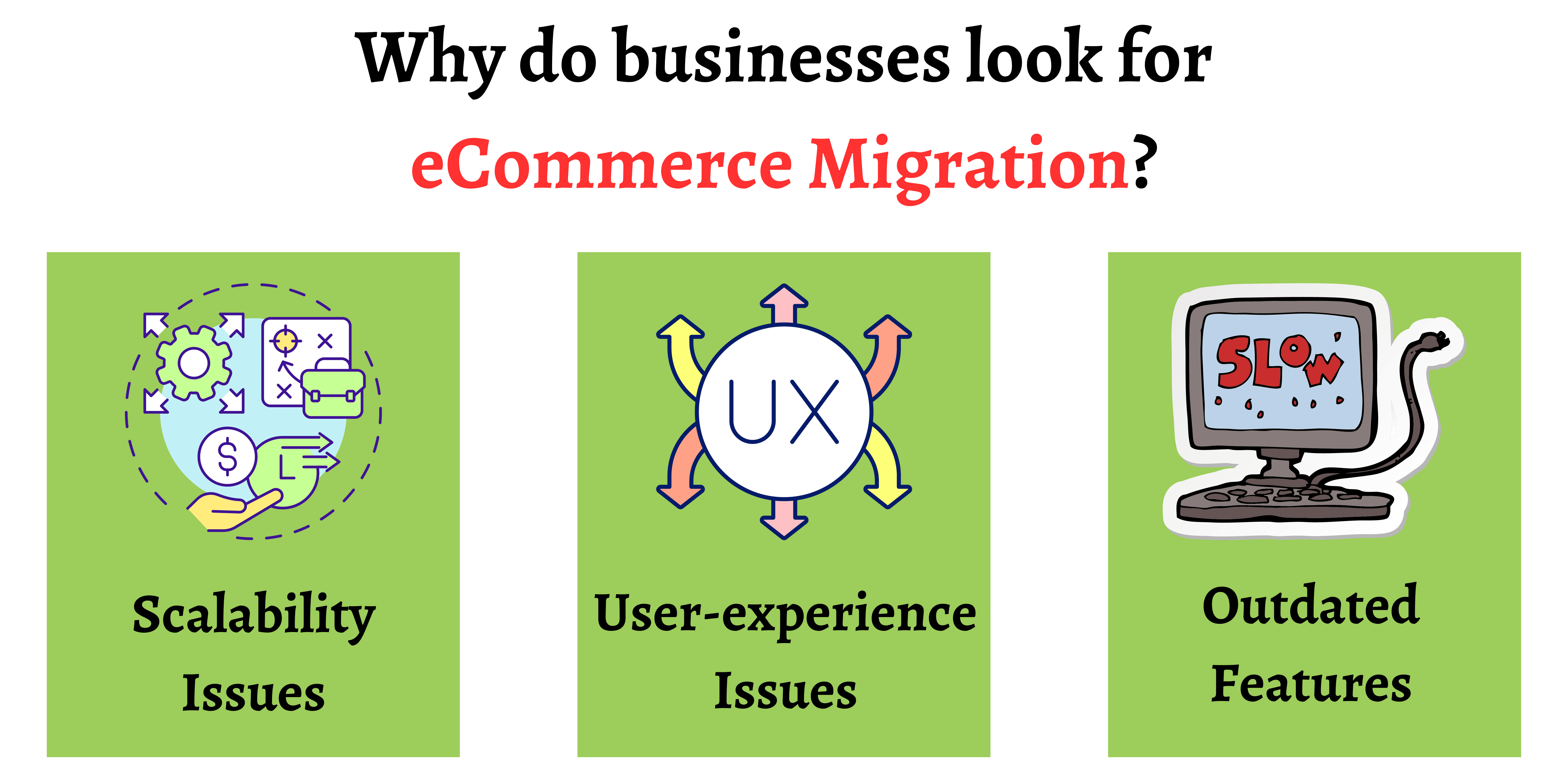
However, the process of migration requires expertise, and partnering with an eCommerce development company is a wise decision. But, before understanding the right platform, it is vital to understand the need for migration.
(a) Challenges With Current eCommerce Platform
There are various challenges that a business can face, some of which are illustrated below:
l. Scalability Issues
Not every eCommerce platform is adaptable to work seamlessly in high traffic. This creates performance issues, causing website downtime that can ultimately lead to loss of sales and frustration in customers.
ll. User-experience Issue
The website’s user experience plays an important role in the success of a website. But when it performs slower, it causes negative impressions on the clients. This leads to users abandoning the site and going to the competitor.
lll. Features
With laggy features and an unresponsive layout, it becomes very hard for an eCommerce website to survive in this competition-oriented landscape. This is one of the prime factors that make a business migrate its website to an eCommerce platform.
(b) Which is the Right eCommerce Platform?
Your current eCommerce platform has certain problems that create an urge to choose the right eCommerce platform. But it is not as easy as it seems; you have to consider some tips before selecting the right platform for website development. From ascertaining your business requirements to looking for the features you require can help you select the right platform for your business. However, Shopify is among one of the most popular eCommerce development platforms.
Overview of Shopify
Shopify is one of the most popular eCommerce platforms, with over 4.6 million+ eCommerce sites. It is a user-friendly platform with robust and updated features. This means it is not meant for only small to medium-sized businesses because of the different available plans suitable for any business.
The intuitive design and extensive features of this SAAS-based eCommerce platform make it an ideal choice for a business to enhance its online presence.
Why Does Shopify Stand Out?
Merchants can build modern online stores and improve their chances of attracting the eyes of advanced users using this platform. From seamless payment gateways to customizable themes, it provides a comprehensive suite of tools.
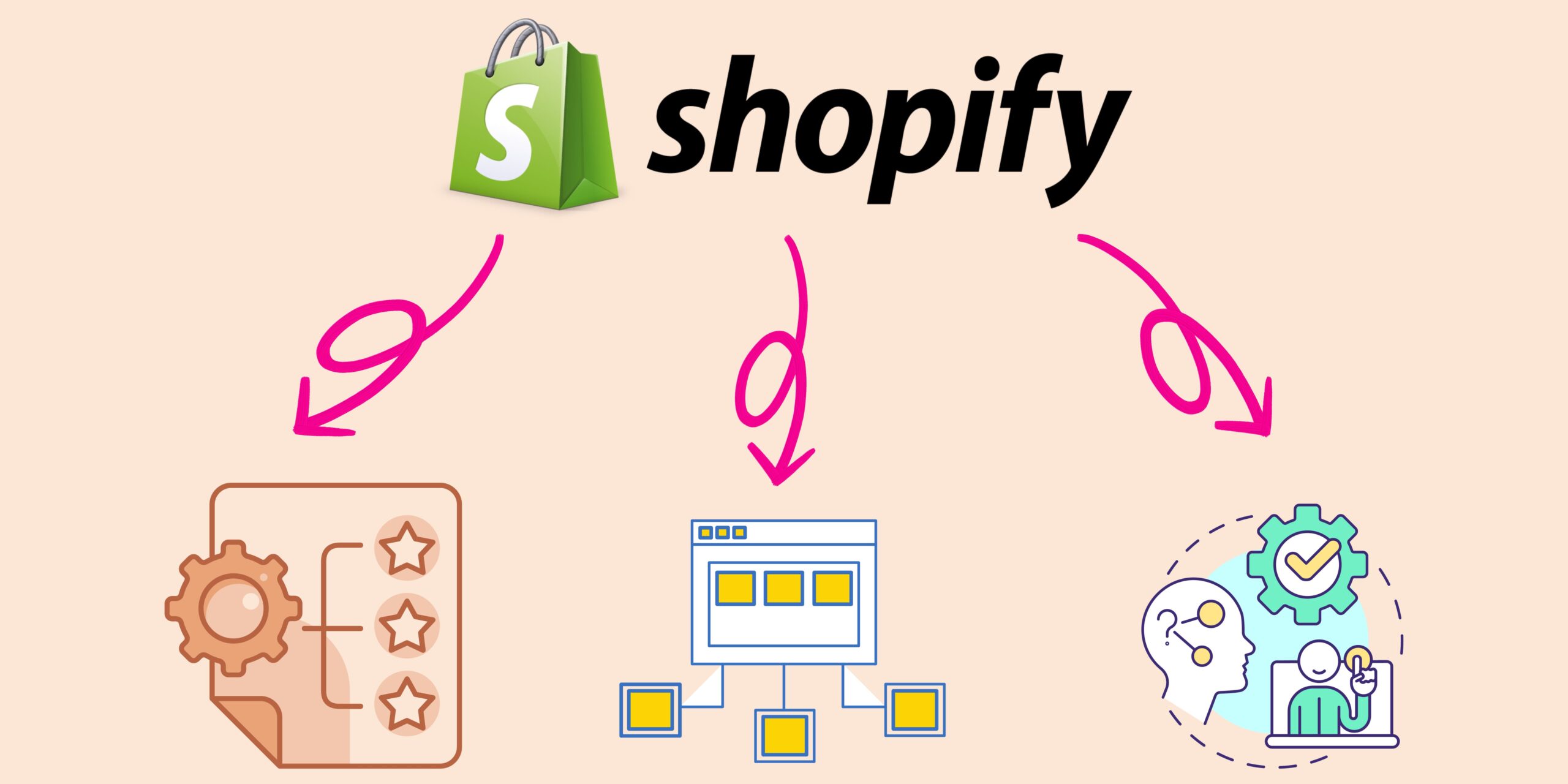
The benefits of Shopify extend beyond the surface, influencing user experience, mobile responsiveness, and the integration of third-party apps. There are various ways in which Shopify stands out as the most dependable platform for a business. These are:
1. Robust Functionality
This platform offers various features that a business can utilize to customize its online store and creates possibilities for enhancing the customer experience. These features consist of abandoned cart recovery, email marketing, and social media integration.
2. Scalable Websites
Shopify is helpful in creating scalable websites. Its architecture enables it to handle numerous visitors and transactions without slowing down. It is built on a cloud-based platform, which means that it can scale up or down as needed. This makes it ideal for a business that experiences sudden traffic spikes, such as during holiday sales or product launches.
3. User-friendly Interface
Shopify is designed to empower businesses with easy navigation and efficient management. It provides a centralized location for all business operations, making it easy for users to track their progress and stay on top of their tasks.
How is Shopify Preparing for the Future?
We are evident with the boom of Artificial Intelligence (AI) in every industry. The eCommerce industry has also noticed this transformation, and Shopify is the premier one to adopt this change. This platform is launching multiple products and services leveraging the power of AI.
One of the products is Shopify Magic. It comprises all the power of Shopify with the recent advancements in AI to provide personalized and contextually relevant support.
Shopify Magic can help business owners in a variety of ways. For example, it can:
- Answer questions about using Shopify
- Provide recommendations on how to use Shopify
- Spot potential problems
- Track a business’s progress and help in achieving its goals.
Though Shopify Magic is still in its early stages of development, it has improved how businesses interact with their eCommerce platforms. With personalized and contextually relevant support, it can help a business save time, improve its results, and reach its full potential.
The Future of eCommerce with Shopify
Whether you are watching an ad on Facebook or an influencer promoting products on YouTube or Instagram, eCommerce is everywhere. But all these things have some other sort of risks like data security, fraud, and customer service associated with it.
To overcome these issues, Shopify partnered with a global market research firm, Ipsos, to discover the status of the eCommerce industry. With a gamut of surveys, this eCommerce platform came up with multiple ideas for supply chain, marketing, and retail.
1. Supply Chain
To overcome the challenges in the supply chain, Shopify came up with new trends and APIs to digitize the supply chain.
- The Inventory states API is helpful in getting a real-time view of the blog by integrating a management system with Shopify.
- With Shopify flow, you can streamline and reduce manual work.
- You can easily turn your savings into earnings with Shopify shipping, a no-fee platform.
2. Marketing
With the growing demands of merchants and eCommerce, many laws and orders regarding the data of the customer are issues for marketers not properly focusing on the proper audience number. Shopify comes in handy in this case:
- With Shopify collabs (an all-in-one marketing application that helps brands recruit, manage, and collaborate with brands), you can reach more users through influencer marketing.
- You can get in front of people who are more likely to buy from your business with Shopify Audience.
3. Retail
Customer satisfaction is one of the main things to consider if you are an eCommerce business. With Shopify, you can get an advantage in many areas, such as:
- Shopify POS is helpful in delivering a world-class customer experience by giving them instant access to the information they need.
- Shopify never fails to amaze store owners, and one such change is the enhancement in the discoverability of a retail store.
- This is all because of the Google Local Inventory integration that helps a business synchronize the inventory of a store with Google.
- Also, this platform makes in-person selling possible from anywhere.
Why Should You Migrate to Shopify?
Shopify provides various features that help a business to stand out in the prevailing competition in the market. But, if a business is looking to migrate its previously built eCommerce store to Shopify, they can consider questions like: Is it beneficial? What are the benefits it provides to a business?
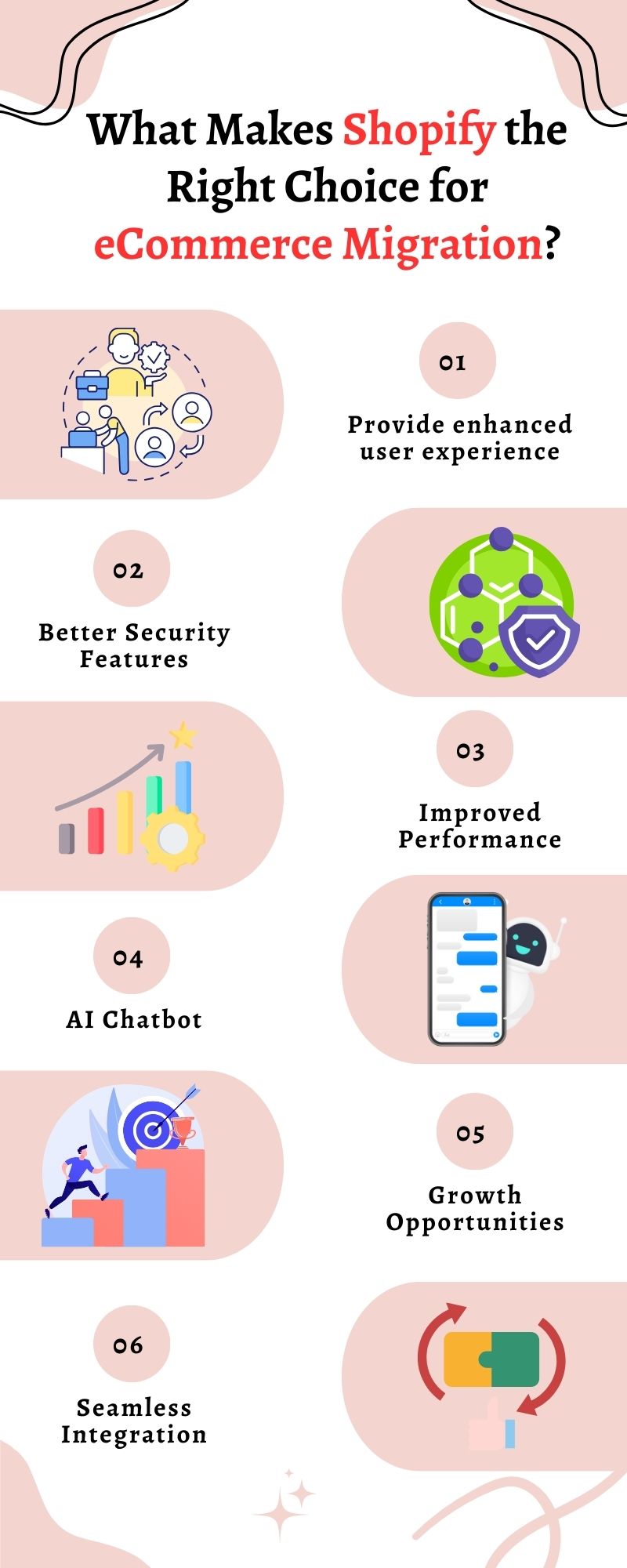
All these questions are worth considering when pursuing this process. But migrating an eCommerce store to Shopify offers various benefits to a business, such as:
1. Enhanced User Experience
One of the benefits of migrating your eCommerce store to Shopify is the opportunity to create an online store with an enhanced user experience. This can be done through redesigning your website.
It could include improving the layout of your online store, integrating new features (such as a wishlist button, customer reviews section), etc., to create a better web experience for your customers.
For instance, if your current eCommerce website has a layout that is cluttered and an outdated design, it is wise to migrate your store to another platform. This way, a business can create a modern and user-friendly online store, helpful in enhancing customer engagement and sales.
2. Improved Security
Security plays a quintessential role in the success of an online store. With the advanced security measures of Shopify, like password encryption, two-factor authentication, and so on, you can create a secure online store. Not only that but if you are looking to migrate your store to Shopify, these measures play an essential role in safeguarding the critical data of users.
This is especially important in today’s fast-paced environment, where cyber threats are constantly evolving. By migrating your previously built store to Shopify, you can develop an online store built with the latest security standards.
3. Better Performance
The performance of your website is essential in uplifting the user experience. A slow-performing online store (such as load time issues or frequent downtime) could result in the loss of potential customers. This is because customers are less likely to purchase from a slow and unresponsive online store.
Migrating your store to Shopify can help you improve the site’s speed and performance. With its enhanced features and robust functionalities, a business can provide a seamless shopping experience for customers.
4. Growth Opportunities
An online store that is not well-equipped to handle the increased traffic is a critical threat to the growth opportunities of a business. In the cases of excess traffic, it crashes, leading to loss of sales and damage to brand reputation.
Migrating your previously built store to Shopify increases your chances of upholding these opportunities. It is because of the scalable architecture of this eCommerce platform that can handle large amounts of traffic without crashing. Working with a Shopify ecommerce developer can help you migrate your online store to Shopify and take advantage of this platform’s scalable architecture.
5. Seamless Integration
The app store of Shopify is one of its strengths it offers various add-ons to enhance the functionality of an online store. With this platform, you can seamlessly integrate the desired third-party applications into your website. Whether it’s the inventory tracking feature or integration of payment gateways, these integrations play a pivotal role in uplifting your eCommerce game to the next level.
6. AI Chatbot
The chatbot of Shopify enables human-like interactions. With Shopify developers, you can integrate these AI chatbots into your online store. They become better with the utilization of AI and ML to analyze data and simultaneously update the results regularly. Artificial Intelligence helps the chatbot to provide answers like humans but at faster rates.
Steps to Migrate your e-store to Shopify
You have to remember various aspects while migrating your online store to Shopify. This might seem overwhelming, but opting for Shopify development services can help you minimize store migration efforts.
Here are the steps
A. Pre-Migration Process
You have to make thorough preparations before migrating your online store to Shopify. This includes
- Backup of your Data
- Notifying Stakeholders
- Conducting a detailed analysis of your platform’s strengths and weaknesses
B. Data Migration Process
The data migration process plays an important role in transferring your online store to Shopify. You have to consider careful planning to execute smooth migration. This includes
- Setting up a Shopify account
- Choosing the right plan
- Customize the site settings
- Importing product information
- Transferring customer data
Shopify simplifies this with user-friendly tools to seamlessly transfer product listings, customer data, and order histories
C. Post Migration Considerations
It is essential to check on your newly migrated store to Shopify regularly. This is where working with eCommerce web developers is helpful, as they can thoroughly test and address any issues promptly.
What do you Need to Consider When Migrating to Shopify?
There are various you need to consider while migrating your online store to Shopify. This includes:
1. Removal of specific protocols
One of the important considerations to consider is to remove the “HTTP” and “HTTPS” protocols from your URLs. This is because Shopify uses a single protocol for all of its pages, ensuring optimal consistency and accessibility of all your URLs.
2. URL redirects
You will also need to create URL redirects for any pages that you have changed the URL for. To prevent loss of customers due to the unavailable pages after migrating from WooCommerce to Shopify migration or from any other platform, setting up URL redirects is essential.
How Does CSSChopper Help Businesses to Migrate to Shopify?
Manual migration is daunting and prone to errors that even result in data loss. Hence, we help you with Shopify migration services to help you easily migrate your online store from any eCommerce platform to Shopify. Our team of skilled Shopify developers follows a standard process to ensure flawless migration.
We set up the project and did the data backup by precisely understanding your requirements. Based on it, our eCommerce web developers will migrate your old online store to Shopify and configure it with thorough testing.
After completing the migration process, our team will help you with any technical issues with your Shopify store. We have a proven record of assisting diverse businesses across a variety of sectors and needs. Our team has the necessary expertise and experience, which can be a game changer in Shopify development.
Categories
Recent Posts
Popular Posts
- How to Choose a Reliable Offshore Development Partner?
- Transforming Web Development with HTMX’s Declarative Approach for Dynamic UIs
- How to Outsource Web Development in 2025: Complete Guide
- What are the Top Web Development Trends for 2025?
- 5 Important Aspects to Consider When You Hire a PHP Developer

